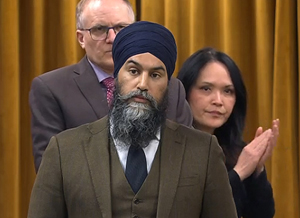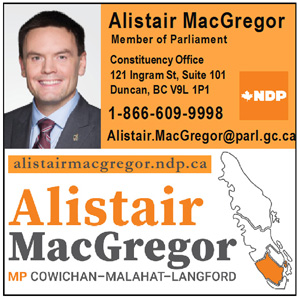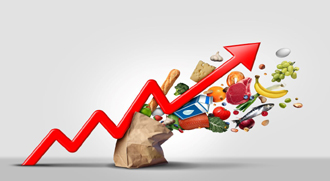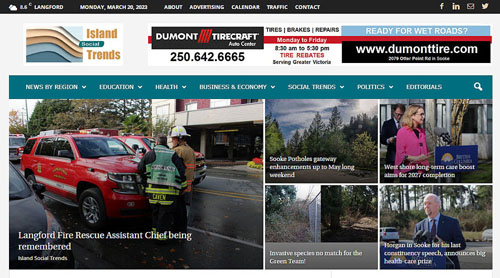Thursday March 23, 2023 | LANGFORD, BC
Editorial commentary by Mary P Brooke | Island Social Trends
The way things are and the way things used to be. And how did that transition happen?
Today NDP Leader Jagmeet Singh stated the obvious, but it’s something that used to be: “Canada should be the best place to live, work and raise a family. One good job should be enough for Canadians to afford a place to live that meets their needs, and still have some savings left over when the bills are paid.”
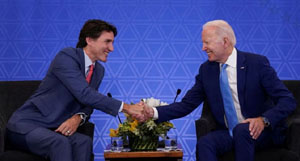
And today he linked that to suggesting that the federal Liberal government keep that in mind as US President Joe Biden visits today. Canada’s economy is inextricably linked to that of the United States; we all know this (especially when NAFTA / USMCA are highlighted in the news), but may not always admit how fearful it would be to have things go wrong between the two countries.
For many individuals and families that has not been the case for over 30 years. Canadian politics are really only just waking up to what was a quiet steamroller over the middle and working classes since the mid 1980s. Once the Internet took hold (enabling ecommerce and the fast rise of the financial technology sector) and global trade became the norm, many people, families and communities have been systematically left behind.
It took a calamitous event — the COVID pandemic — for political leadership across Canada to realize that the Canadian dream not only had shifted (perhaps irrevocably) but that urgent supports (like CERB during the pandemic, made adequate by NDP pressure upon the minority Liberal government) were needed just to keep society and economy from bursting at the seams.
And now the federal government — signalling ‘financial prudence’ in their Budget 2023 coming next week, is likely to try going back to the old ways of believing the forever-gone Canadian dream. They are evidently going to provide some relief or support (for the lowest-income Canadians) but without changing the structural direction of the economy, everyday people will tread water at best in the face of inflation that has pushed up the cost of everything (and which has now become embedded in things like groceries and insurance, and the multitude of services and products which include those as built-in costs).
It takes two incomes to raise a family for at least 20 to 30 years now, if even that is enough. Parents barely have enough time for quality attention to their children (and caregiving is left to child care services that themselves are struggling for lack of adequate staffing), and then schools and society wonder why mental health strains are causing serious problems for youth. Young adult males (age 25 to 40) have the highest rates of suicide in the construction industry, as one example of where too much burden is falling on too few, and how some sectors suffer more than others due to socioeconomic design.
The BC government has come out with their affordability credits (in January and upcoming in April), which shows the NDP government’s heart is in the right place along with budget smarts to make some support happen, though with Premier David Eby ably admitting that it won’t cover all the bills.
The federal Liberal government has its heart in the right place to help (by way of bending to the well-crafted demands of the NDP on behalf of people’s well-being) but doesn’t really have it in their philosophical DNA to allow for true structural change in how the economy works for people or small business. Compounding that is the draconian approach of the Bank of Canada to use its one blunt tool of manipulating interest rates, which uses early-cycle homeowners and small businesses that rely on credit as its fodder for nothing short of cruel outcomes.
Small business is the backbone of the Canadian economy. These small enterprises — often funded on an individual’s or family’s own resources — create new directions in business, hire people for their first jobs or for interesting new flexible jobs, and interface directly with their communities. However, the corporate system is set up to pressure and push down small business, allowing just a few to sneak through the hoops to larger success. Women-owned businesses and businesses run by ‘racialized minorities’ (which is a description requiring an essay unto itself) are still systematically held back through selective financing and curtailed networking opportunities (whether unconscious or contrived).

The gig economy has emerged over the past 20 years. Its definition by governments (who see that sector as workers for larger entities) is not really recognizing the precarious work sector for what it is… a necessary response to the exclusion that the larger economic system places on people. It’s a stop gap or perhaps a fail safe to help shore up the gap in affordability in this country. Does it ever really sink in that the average Canadian debt is over $1.80 for every dollar earned? That is clearly unsustainable, and see people fleeing to food banks, and even going hungry in this latest year of inflationary pressure.
Awareness of all this is emerging, which is the good news. That individuals and families are struggling just to put food on the table is the very bad news, and the prospects of that getting much better any time soon do not look promising.
Relying on political leadership to make the necessary changes across Canada is the clearly one of the largest challenges of this decade. Some of the simple fixes would be establishing a basic annual income, cutting the central bank rate down again, offering truly structural supports for small business, regulating the credit card companies over their interest rates, and shoring up food sustainability in all ways (soil, production, distribution, nutrition education, and improving the quality of products available at food banks).
Locally, the MP for Cowichan-Malahat-Langford says Canadians are working hard, playing by the rules and doing everything right—and yet struggle to go ahead. “Because of the way the system is set up, the ultra-wealthy who break the rules continue to get away with reaping record profits on the backs of Canadians while avoiding paying taxes. In order to stop corporate greed from harming Canadian families, the government must act. Enough is enough,” says MacGregor.
“With all the challenges we are facing— from inflation to the war in Ukraine to the disruption of the world supply chain and to income inequalities— it is more important than ever that we put in place a windfall profits tax against corporate greed and put that money back into the pockets of Canadian families who need it,” says MacGregor, who is the NDP Critic on Food Prices, and sits on the House of Commons Agriculture and Agritech Committee.
===== RELATED ARTICLES by ISLAND SOCIAL TRENDS:
- Food prices remain high, consumers hear more about grocery sector (Mar 11, 2023)
- Three grocery CEOs to address federal agriculture committee (Feb 26, 2023)
- Eby preludes Budget 2023 in 100-day speech (Feb 25, 2023)
- Food inflation riding high at 11.4% (Feb 21, 2023)
- Grocery chain CEOs being summoned to address Agriculture-AgriFood Committee (Feb 14, 2023)
- Alistair MacGregor leads NDP investigation into high food prices (Feb 13, 2023)
- Small bank rate increase is still an economic shock (Jan 25, 2023)
- Cost of living efforts: BC Hydro bill credit & BC Affordability Credit (Nov 18, 2022)
- CERB gets extended thanks to NDP pressure in minority scenario (June 15, 2020)
===== ABOUT THE WRITER:
Island Social Trends Editor Mary P Brooke is a long-time observer of the socioeconomics of Canadian society. Her sociology essays in university days explored these issues long before they were mainstream; in those days she was a winner of the McGeachy Prize in Journalism. She has always maintained a socioeconomic lens in her journalism over the past 30 years.
Ms Brooke launched MapleLine Magazine (2008-2010) then expanded to weekly regional news with Sooke Voice News (2011-2013) and West Shore Voice News (2014-2020), before expanding to Vancouver Island, BC and national news attentiveness with Island Social Trends in mid-2020.
Mary P Brooke holds a B.Sc. in health science with majors in community education and sociology, as well as a university certificate in Public Relations, and an industry-sector digital marketing certificate. She has been a lifelong entrepreneur and publications creator. Her company Brookeline Publishing House Inc was launched in Victoria in 1995, and was one of the first companies in Canada to offer online training and web hosting. She has hosted radio. She now participates in BC Legislative Press Gallery reporting.
She ran for school trustee in 2022 as a community service.




